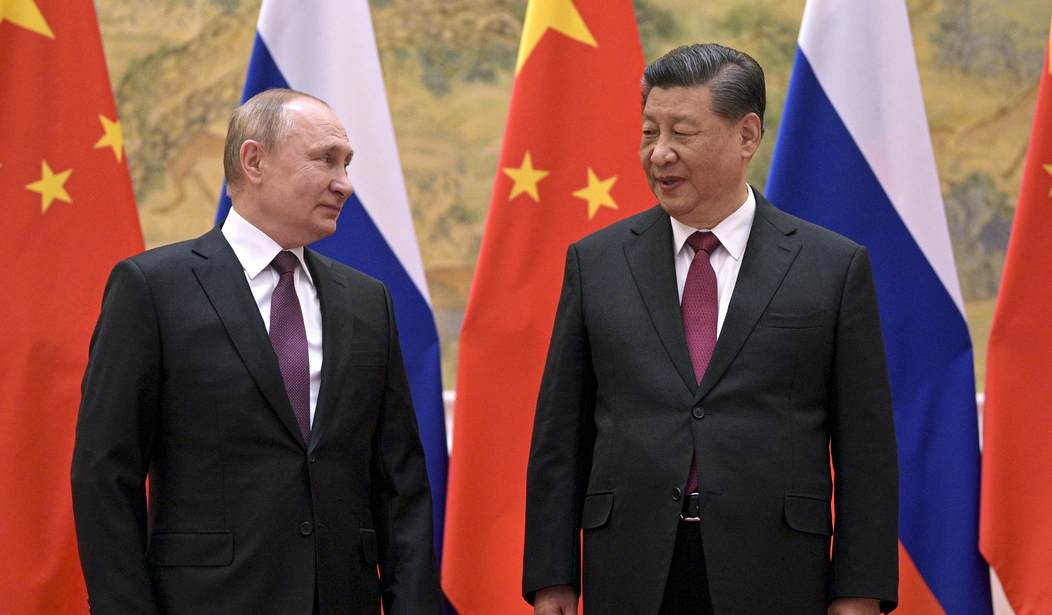After months of hoping the war in Ukraine could be limited, it might alas be that a full-scale Cold War is back, says the New York Times. “Secretary of State Antony J. Blinken says Washington has indications that Beijing is strongly considering giving military aid to Moscow for the war in Ukraine,” broadly described as weapons and ammunition. “There is no doubt that China’s entry into the war in that manner would transform the nature of the conflict, turning it into an epochal struggle involving all three of the world’s largest superpowers and their partners on opposing sides: Russia, China, Iran and North Korea aligned against the United States, Ukraine and their European and Asian allies and partners, including Japan and South Korea.”
“Epochal” may mark an end to the Biden administration’s efforts to limit the war. “The fact Mr. Blinken spoke out publicly shows the desperation of the United States as it tries to dissuade Mr. Xi and his aides from doing so.” With the entry of China, the strategic balance between opposing coalitions is more nearly even. But in this second Cold War, Russia will by far be the junior partner to China. If China becomes Moscow’s arsenal in this conflict and the war in Ukraine continues for years, Russia will owe its soul to the CCP store. “China is still on the rising trajectory towards becoming a superpower whereas Russia is a former superpower… in no position to call the shots,” according to one China expert. The ratio between China’s and Russia’s GDPs, the RAND Corporation points out, was roughly 5.8 to 1 in 2016 and is projected to reach 8 to 1 in 2040.
Related: Shifting From Utopia to Survival Mode
This disparity may also spell the end of Russia’s unilateral control over Ukrainian military operations, as the center of decision-making passes to Bejing. RAND believes that “Vladimir Putin is an opportunistic risk taker, whereas China’s post-Mao leaders have proceeded cautiously and gradually to expand their country’s influence.” As Xi waxes and Putin wanes, China’s interests will begin to predominate over the Kremlin’s, ironically creating opportunities for a negotiated settlement that did not exist before, if Beijing pays Moscow’s gambling debts.
Right now, the Kremlin’s need is immediate. Beggars can’t be choosers, and Russia is expending manpower at a prodigious rate on the Ukrainian northeastern front, averaging over 800 casualties per day. This is partly the result of the lack of the weapons and ammunition necessary to make a combined arms assault possible. “The uptick in Russian casualties is likely due to a range of factors including lack of trained personnel, coordination, and resources across the front – this is exemplified in Vuhledar and Bakhmut,” according to the UK Ministry of Defense.
These losses must be borne, not by the inexhaustible manpower pool of Stalin’s USSR but by the collapsed demography of Putin’s Russia. The authorities are relentlessly combing out the military-age male population for replacements and finding it harder. “The Russian government has created a new unified database listing all of those eligible for military service, to make it easier to mobilise people, better able to screen out those with exemptions and catch ‘evaders’ at border checkpoints and via facial recognition cameras.” The old paper-based conscription system was riddled with errors that resulted in draft notices being sent to blind or legless men and other similar fiascos. “This reliance on paper records lies behind the spate of arson attacks on numerous Russian military enlistment offices over the past year. In many cases, the culprits likely beleived they could avoid mobilisation if they destroyed the records.” Maybe Putin can find the men, but he will need Xi to supply the equipment. If Blinken is right, China soon will.
China’s imminent military aid to Ukraine has caught Washington by surprise. To GOP Sen. Lindsey Graham, it was unthinkable. “If you jump on the Putin train now, you’re dumber than dirt. It would be like buying a ticket on the Titanic after you saw the movie. Don’t do this.” But the same could have been said of Putin’s decision to capture Kyiv in the first place. It was dumber than dirt, and still, it happened — because real-world leaders are governed as much by passions and gambler’s hunches as by rationality. In ways totally unanticipated by the experts, the war in Ukraine began and expanded, growing in extent and scope from a part-time, distant affair beyond Western borders to something that, in the words of Foreign Policy, could have “devastating consequences for… the global economy”.
Perhaps it was its sheer unthinkability that actually made the danger more likely to sneak up on Western capitals and institutions who, obsessed with the notion that the only problems left to solve were climate change and DEI, never imagined that a Russian despot might send tank armies across European borders to grab territory in contravention of international norms. Nor could they have imagined the total intellectual furniture of their world — guaranteed incomes, environmentalism, open borders, widespread woke culture — smashed to pieces, leaving the passions and imperatives of the forgotten past in their place. By the end of this decade, there’ll be a lot less desire to eat bugs, live in dark, unheated ruins, and make out with bearded ladies. Privation and the survival imperative bring the basics back.










Join the conversation as a VIP Member